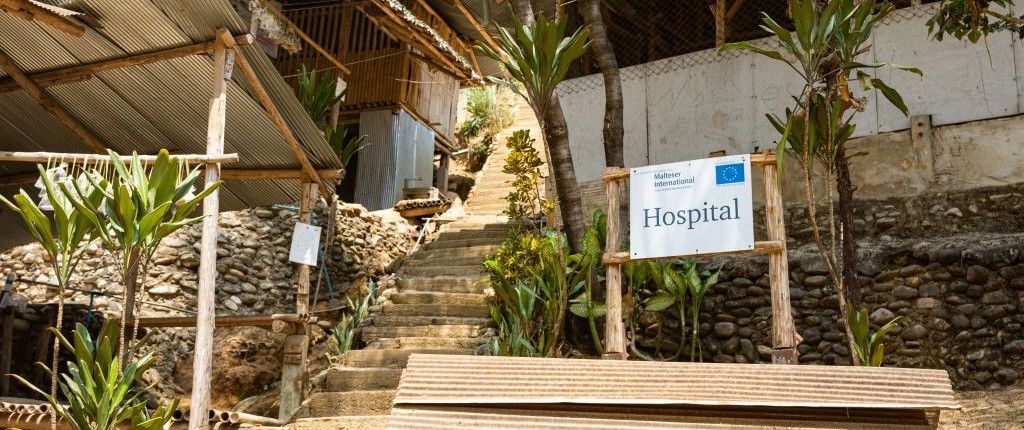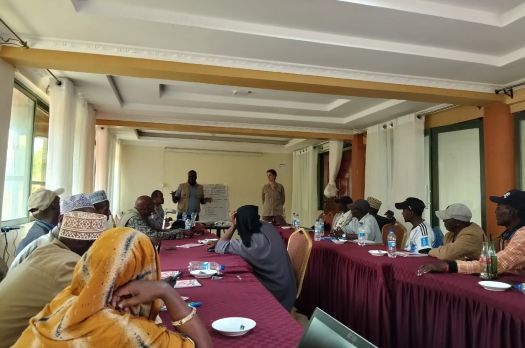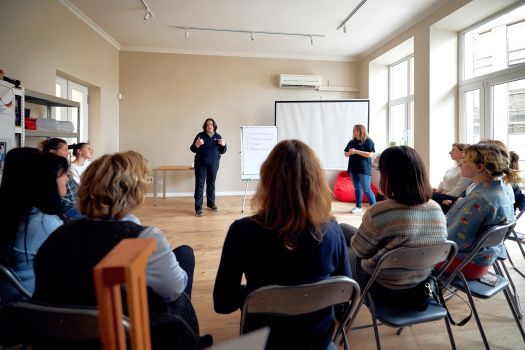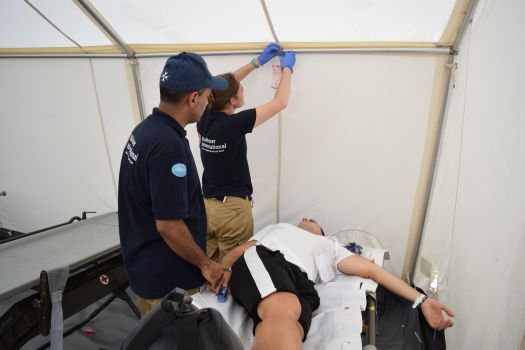
Health is the foundation for sustainable development
At Malteser International, we aim to support a live in health and dignity for people in need. How, though, do we even know what that means for different people in different places, cultures, climate zones around the world? As our Global Health Advisor, it is Ludmila Lobkowicz' job to monitor the health situation in our project countries, witness health-relateded local challenges, talk to our partner organizations and in-country staff and – most importantly – the people we would like to offer our support. Ludmila Lobkowicz and her colleagues in our Quality team ensure that our measures are needs-based and sustainably effective. We talked to her about her job, health around the world and Malteser International's most important health measures.

What is your job at Malteser International? What do you do and what does your role involve?
Ludmila Lobkowicz: I work as a Health and Program Advisor, providing guidance across all our program regions on the health projects that Malteser International implements together with partners. This includes supporting needs assessments, the design of health projects, and advising on implementation issues. I support my colleagues who develop and run humanitarian programs with all questions related to health – for example, on best practices in integrated disease surveillance systems, minimum standards in primary healthcare delivery, or strengthening health information systems.
Health is at the core of Malteser International’s work. Why?
Ludmila Lobkowicz: Firstly, providing health care to people in need has been part of the tradition of the Sovereign Order of Malta for centuries. Its guiding principle is Tuitio Fidei et Obsequium Pauperum – “Bearing witness to the faith and helping the poor”. As early as 1048, the first hospital for pilgrims and the sick was opened in Jerusalem, and since then care for the sick has been at the heart of the Order’s work.
Secondly, numerous scientific studies confirm that health is crucial for quality of life and social participation. In our work, we put into practice the definition of health set out by the World Health Organization: health is more than the absence of disease; it is a state of complete physical, mental, and social well-being. We also recognise the close interconnection between human, animal, and environmental health, which is why the One Health approach informs many of our programmes. Higher levels of health of a human are strongly linked to longer life expectancy, better educational and employment opportunities, and greater social and economic participation. We do not only read this in studies – we experience it daily in our work.
Health is therefore both a foundation for sustainable development and an expression of our Order’s tradition and thus plays a central role in the mission of Malteser International.

You are based in Cologne, but you travel a lot for your work. Why is it so important that you visit the projects regularly?
Ludmila Lobkowicz: Statistics on a computer and video calls with colleagues in the regions can never replace on-site assessments or evaluations, which allow for a personal impression and direct exchange with staff, affected communities and project participants. Through conversations with people on the ground, I gain a much better understanding of the support they currently need most urgently and whether ongoing project activities should be adjusted or improved – always with the aim of achieving the greatest possible benefit for the project participants.
Direct contact with local actors is indispensable: it builds trust, enables a deeper understanding of the social and cultural context, and strengthens collaboration between international and local partners. Only in this way can I provide my colleagues with sound advice on how to design measures that are needs-based and sustainably effective.
What are the main health challenges faced by people in our project regions? Do people in Colombia have different health concerns from those in Uganda or Thailand?
Ludmila Lobkowicz: The biggest health challenges vary greatly depending on country and context, yet some overarching patterns can be observed.
In many of our project regions, people face basic problems such as limited access to primary healthcare, a shortage of qualified health personnel, under-resourced facilities – for example, a lack of medicines and medical supplies – as well as gaps in health financing. Those most affected are often people in remote areas, internally displaced persons, refugees, and others whose current living conditions expose them to heightened health risks.
At the same time, health concerns are highly context-specific:
- Colombia: In Colombia, the health impacts of decades of conflict, displacement, and violence are a major issue. Many people in our projects suffer from psychosocial stress and trauma, while rural regions face significant gaps in services, particularly in maternal and child health and mental health. Thus, Malteser International, together with local partners focuses in Colombia on maternal & child health, primary healthcare in remote areas as well as mental health and psychosocial support.
- Ukraine: In Ukraine, Malteser International, together with local partners, focuses particularly on psychosocial support for people deeply affected by war, displacement, and violence. Mental health services range from psychological first aid, counselling and group sessions to more specialised therapeutic support. Children and young people are given special attention, for example through mobile play and recreational programmes designed to help process traumatic experiences. At the same time, doctors and nurses are trained in stress management, burn-out prevention, and psychological first aid, strengthening the resilience of the health system under the ongoing crisis conditions.
- Uganda: In Uganda, infectious diseases such as malaria, HIV/AIDS, and tuberculosis remain widespread and pose a major burden on the population. Malteser International works above all in the large refugee settlements, where millions of people from South Sudan and the Democratic Republic of Congo have sought refuge and where needs for WASH, food and nutrition security, and health are immense. Malteser International is also involved in developing and expanding emergency medical services, to improve the rapid treatment of acute cases on a national scale.
- Thailand: While Thailand has a comparatively well-developed health system, our work focuses on particularly vulnerable groups such as migrants and ethnic minorities in border regions. These groups often have only limited access to health care and are more exposed to health risks, including infectious diseases.
These examples show that health cannot be considered in isolation: it is closely linked to social, political, and economic conditions. That is why we tailor our programmes to the specific needs and challenges of the people in each context.

What are the main health interventions of Malteser International?
Ludmila Lobkowicz: Malteser International places people’s health and well-being at the centre of its work. We pursue a comprehensive approach that considers physical, mental, social, and psychological aspects of health.
A key priority is linking health with water, sanitation and hygiene (WASH), as well as food and nutrition security (FNS). Only through integrated programmes can we contribute effectively to sustainable improvements in health and quality of life. Building on this integrated approach, we also apply the One Health approach, acknowledging that the health of people is closely linked with the health of animals and the environment – for instance in the prevention of zoonotic diseases and in promoting sustainable community health. Our activities include both acute humanitarian aid and resilience-building approaches in primary and community health care.
Our work aims to strengthen key building blocks of healthcare systems, particularly service delivery, the health workforce, access to medicines, vaccines and medical technologies, and health information systems.
The main health measures of Malteser International are structured into emergency aid and resilience-building. In emergencies, MI can deploy a WHO-certified Emergency Medical Team and has a specialised Infection Prevention and Control (IPC) unit to support disease outbreak responses. In primary and community health care, MI focuses on i) general clinical health services, ii) child health, nutrition and WASH, iii) “My Healthy Schools” – health-promoting schools, iv) control of communicable diseases, v) maternal and newborn health, and vi) treatment of non-communicable diseases and promotion of mental health. In addition, Malteser International is developing and expanding emergency medical services in Uganda, Kenya, and Rwanda to improve the rapid treatment of acute cases on a national level.
Through this integrated approach, Malteser International is able to deliver both curative and preventive measures in health, WASH, and FNS – thereby strengthening the health of people in acute emergencies as well as in resilience building processes.
(September 2025)








